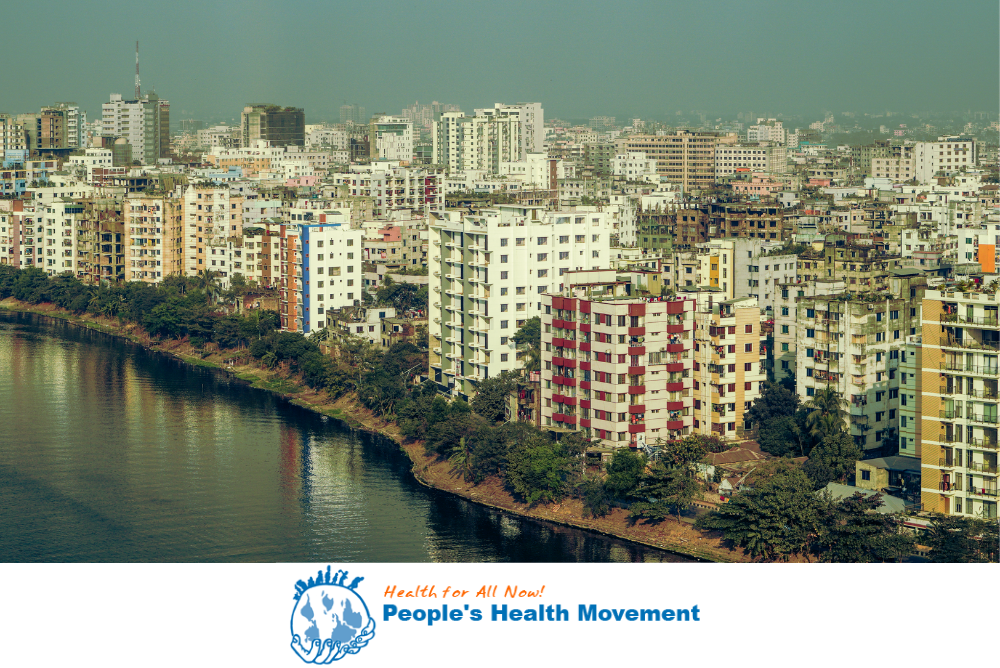Statement on Bangladesh Unrest
Solidarity Statement
People’s Health Movement (PHM) - Global
Bangladesh is currently experiencing a turbulent period that began with a demand for quota reform in early July. What started off as a peaceful protest by the university students against the quota system has transformed into a full-fledged crisis affecting the lives and well-being of the citizens due to a nationwide crackdown by state authorities.
Students are demanding the abolishment of the quota system that reserves up to 30% of government jobs for the family members of veterans from Bangladesh’s 1971 War of Independence. Over 18 million young Bangladeshis are without jobs today, according to government figures, the quota reintroduction enraged students facing an unemployment crisis.
The ‘2024 quota movement’ in Bangladesh originated from a long-standing grievance among university students regarding the quota system in public service recruitment in Bangladesh. Students and young professionals have put forth the argument that this system undermines meritocracy and limits opportunities for the broader population. Students are demanding the reformation of the quota system that reserves up to 30% of government jobs for the family members of veterans from Bangladesh’s 1971 War of Independence. From early July until July 29th, the movement saw a significant escalation. Initially, peaceful protests grew larger as more students and other segments of the population joined in. The government’s response was marked by a series of crackdowns, which only fueled further unrest. On July 15th, violence erupted, leading to over 200 deaths and thousands of injuries over the subsequent weeks. This period was marked by widespread demonstrations, application of indiscriminate and lethal forces by law enforcing agencies, and a growing sense of distress among the Bangladeshis home and abroad.
Since the abolishment of the widely popular caretaker government in 2011, the ruling party Awami League has enjoyed unopposed power at the helm. The 3 subsequent elections of 2014, 2018 and 2024 have been heavily criticized for not being free and fair. Pervasive corruption and rampant money laundering has crippled parts of all the state functions in Bangladesh over the last one-and half decade long unchallenged Awami League rule. These issues have eroded public trust in governmental institutions. The judiciary and executive branches have become increasingly politicized, operating under the influence of powerful political elites rather than serving the public interest. The influence of the government over all other subsidiary bodies including the military and judiciary have practically left democracy in a dire state. This environment of heavy political influence has led to a compromised rule of law.
The growing discontent among the masses have seeked refuge in the current quota reform movement. The immediate trigger was the demand for a fairer public service quota system, but the underlying causes were much deeper. The protests have been marked by widespread participation from various segments of society, reflecting a collective yearning for systemic change.
What could have been settled with a dialogue with the students and other stakeholders initially, has been met with severe brutality by the police, military as well as the student wing of the ruling party, ‘Chhatra League’. The crackdown has been characterized by excessive use of force, with the authorities resorting to military grade equipment. The state-imposed curfew which started from 20th July and the nationwide internet blackout from 18th have put forward several fundamental human rights questions. Reports of arbitrary arrests, beatings, and intimidation have emerged, highlighting the government's attempt to suppress dissent through fear and violence. There have also been cases when proper treatment has been denied to those injured. This brutal response has drawn international condemnation.
Against this backdrop, the People’s Health Movement-Global PHM strongly condemns the disproportionate and unjust force used by the state, which has put the lives and health of its citizens in danger. PHM demands an independent inquiry under the jurisdiction of the United Nations and those who are culpable for the violence be brought under justice. PHM has a long history of working with health networks, young people and other social justice and women’s groups in Bangladesh for the last two decades to build health for all and social justice, globally.
PHM Global voices deep concern about the escalating situation and violence, expresses condolences to the affected families, and stands in solidarity with students, and the movement of the people of Bangladesh.


